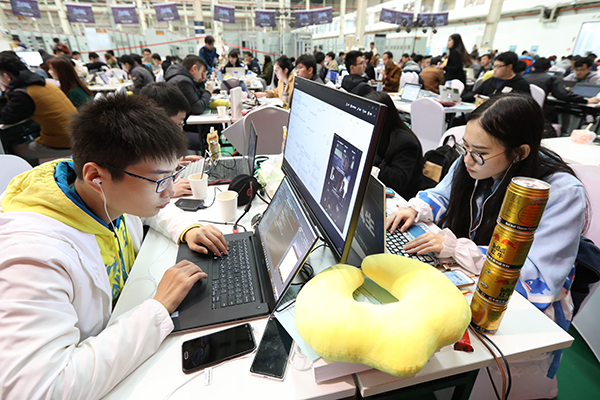Hong Kong should uphold its executive-led political system with the chief executive at its core, as set out in the Basic Law, the nation’s top legislator said on Saturday.
Zhang Dejiang, chairman of the Standing Committee of the National People’s Congress, said that the development and improvement of the Hong Kong special administrative region’s political system must also be compatible with this basic principle.
Zhang also stressed that the Hong Kong team of public officers formed in accordance with the Basic Law must be composed of patriots who respect the Chinese nation, wholeheartedly support the motherland’s resumption of exercise of its sovereignty over Hong Kong and will not do things that undermine Hong Kong’s prosperity and stability.
Zhang made the remarks at a high-ranking symposium in Beijing commemorating the 20th anniversary of the implementation of the Basic Law of the Hong Kong Special Administrative Region.
He said Hong Kong must adhere to the comprehensive and precise implementation of the Basic Law-the city’s constitutional document that has proved a success since 1997 and has provided a fundamental guarantee for the “one country, two systems” principle to maintain Hong Kong’s long-term prosperity and stability.
Enacted in accordance with China’s Constitution, the Basic Law specifies the guidelines of “one country, two systems” and “Hong Kong people administering Hong Kong with a high degree of autonomy”.
The power exercised by the special administrative region is “delegated by” but “not separated from” the central government, and under no circumstances should anyone be allowed to challenge the power of the central government in the name of a high degree of autonomy, Zhang added.
He called on Hong Kong to rigorously perform its constitutional duty of safeguarding national security through legislation prescribed in the Basic Law, and stop any behaviors or activities that undermine national unity.
The central government has committed itself to upholding the “one country, two systems” policy and the Basic Law, actively supported development in all fields in Hong Kong and faithfully protected the lawful rights and interests of Hong Kong people, Zhang said.
Hong Kong’s Chief Executive Leung Chun-ying, who also attended the symposium, said the “one country, two systems” policy and the Basic Law are “the best constitutional arrangements” for both Hong Kong and the country.
With the combined advantages of “one country, two systems”, Hong Kong can participate in the country’s major development strategies while serving as a “super-connector” between the mainland and the rest of the world, Leung said.
Chairwoman of the Democratic Alliance for the Betterment and Progress of Hong Kong Starry Lee Wai-king urged those from the opposition camp to see the interaction between Hong Kong and the mainland from the positive light of serving the city’s, as well as the country’s, long-term development interests.
Vice-president of the Chinese Association of Hong Kong and Macao Studies Lau Siu-kai believed that people’s opinions may vary because of different political affiliations, but loving the country and the city should be the basic consensus among Hong Kong people.
